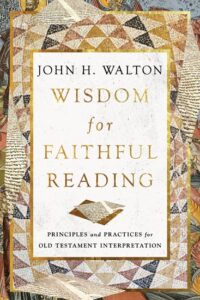Interpreting the Old Testament can be a tricky business. What do we do with all those laws in Leviticus? Do the promises to Israel apply to us or the church, or neither? And those prophecies in Daniel—they are pretty weird. The author of Ecclesiastes also seems kind of depressed. Does he need cheering up?
In Wisdom for Faithful Reading, John Walton (author of the stellar volume The Lost World of Genesis One) offers much helpful advice on how to keep going off the rails into fanciful interpretations of prophecy and unwarranted applications of narratives. His valuable principles include:
♦ Stay close to the biblical author’s intentions and purposes
♦ Consider closely the linguistic, literary, cultural, and theological context of each passage
♦ Don’t impose our modern ideas, context, or worldview on a text
♦ Remember that genre (whether poetry, prophecy, genealogies, narrative, wisdom literature) is key to understanding
♦ Avoid reading the Bible as a how-to book or an instruction manual
♦ Keep asking this main question about each passage: “What can we learn about God, his plans, and his purposes?”
At each point, Walton offers many concrete examples from all over the Old Testament that illustrate and illuminate each point.
 His examples of correct interpretation, however, may reveal a problem for many readers. While his analysis in each sample text is insightful and helpful, he gives the impression that if you don’t know Greek and Hebrew as well as he does, and if you aren’t thoroughly trained in ancient Middle Eastern culture and customs as he is, you can’t possibly understand the Bible. Though he tries to address that, overall it can be discouraging for ordinary readers.
His examples of correct interpretation, however, may reveal a problem for many readers. While his analysis in each sample text is insightful and helpful, he gives the impression that if you don’t know Greek and Hebrew as well as he does, and if you aren’t thoroughly trained in ancient Middle Eastern culture and customs as he is, you can’t possibly understand the Bible. Though he tries to address that, overall it can be discouraging for ordinary readers.
Sometimes he also seems to strip the Bible of its authority rather than highlight it. For example, according to Walton, anything that is common knowledge in the ancient world (like it is bad to steal or murder) would not count as revelation. Only why the author included the Ten Commandments is revelation (pp. 40-47 and 115-16).
I also have questions about the primary mantra he keeps repeating throughout the book: “Only the author’s intentions carry authority.” That is, if the original biblical author never consciously intended a certain meaning, then that cannot possibly be normative for us today. I see at least three problems.
First, for centuries the primary (not the only) way in which the early church fathers interpreted the Old Testament, was to see Christ in every page. And if Jesus is the same as the God of the Old Testament, then there is merit in that approach. Walton would seem to dismiss this out of hand because the ancient writers couldn’t possibly know anything about Jesus, and so he couldn’t be part of their literary intent. Though it is true we must also view the Old Testament on its own terms, I think we dare not shed the perspective of our early Christian heritage lightly.
Second, all authors (biblical or not) communicate things that were not part of their original, conscious message. Yet these are every bit as much a part of the actual communication as that which was consciously intended. The Old Testament authors were thoroughly immersed in the ancient writings that had come before them. The prophets and psalmists knew the Torah deeply. Were they always conscious of when and how it was influencing them? No, but it did. Likewise, are we conscious how assumptions about democracy, individual freedom, capitalism, and (even) Shakespeare are influencing us when we write? No. But these are deep and real influences that emerge in our writing all the time, even when we do not consciously intend them to come out.
Third, I wonder if Walton’s laser-like focus on author intent doesn’t contradict one of his own principles—don’t impose “a foreign perspective on the text.” Isn’t the principle of author intent a modern construct which might get in the way of our encounter with Scripture? Until the last century or so, has anyone in the history of interpretation had such a single-minded obsession with this principle? Doesn’t it largely come out of modern literary theory rather than from the world of the Bible itself?
In this book Walton is legitimately reacting to the many abuses of interpretation that have sadly wracked the church, especially in modern times. The guards he offers to protect against these missteps have much to commend them. But I fear that instead of just reacting to these problems, that he is overreacting.
Having said that, his very last chapter, “Living Life in Light of Scripture,” is a wonderful, clear-headed, positive statement of what we should be looking for from God and his Word. We would all do well to follow Walton’s encouragement to focus on the message of the Bible to trust God, love God, and love others regardless of what life may bring.
